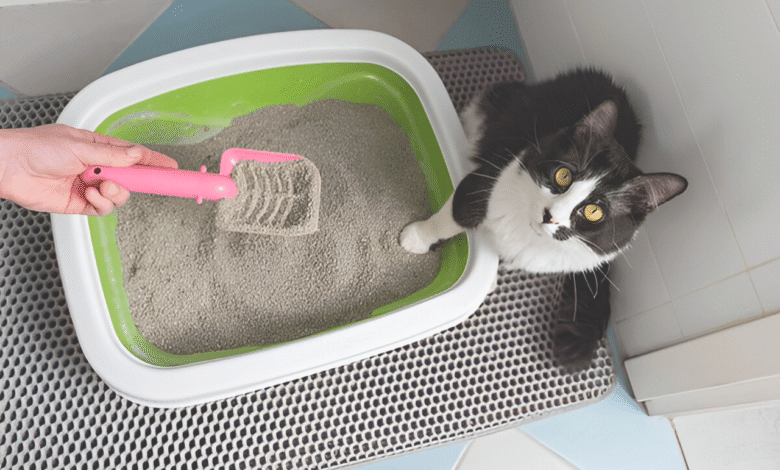
Why Your Cat Is Peeing Outside the Litter Box
Cat Is Peeing outside litter box? Discover 10 reasons why & vet-approved solutions to stop accidents and restore proper litter habits fast.
If your cat is peeing outside the litter box, it can be both frustrating and concerning. This common issue often signals an underlying problem whether medical, behavioral, or environmental. Cats are naturally clean animals, so when they avoid their designated bathroom area, it’s their way of telling you something is wrong. Understanding the root cause is essential to correcting this behavior and restoring harmony in your home.
There are several reasons why a Cat Is Peeing outside the litter box, ranging from urinary tract infections to stress or dissatisfaction with their setup. Ignoring the issue can lead to repeated accidents and even long-term behavioral problems. By identifying the cause early and taking the right steps, you can help your cat return to proper litter box habits while ensuring their health and comfort. This guide will explore the most common reasons behind this behavior and provide practical solutions to address it effectively.
Why Your Cat Is Peeing Outside the Litter Box
Medical Issues
Before assuming your cat is acting out, it’s essential to rule out medical conditions that could be causing discomfort. Urinary tract infections (UTIs), bladder stones, diabetes, and kidney disease can make urination painful, leading your cat to associate the litter box with discomfort. If your cat is straining to pee, producing small amounts of urine, or crying while urinating, a vet visit is urgent. Cats with arthritis or mobility issues may also avoid the litter box if it’s too high-sided or difficult to access. Senior cats, in particular, may struggle with joint pain, making it hard for them to climb into their usual spot. A low-entry litter box or one with a ramp can help alleviate this issue.
Stress and Anxiety
Cats are sensitive creatures, and changes in their environment can trigger stress-induced Cat Is Peeing. Events like moving to a new home, introducing a new pet, or even rearranging furniture can make your cat feel insecure. Stress-related Cat Is Peeing often occurs on soft surfaces like beds, carpets, or laundry, as these materials provide comfort. To reduce anxiety, provide safe spaces, pheromone diffusers (like Feliway), and consistent routines. If your cat is marking territory due to stress, neutering or spaying can help, especially in unaltered cats. Additionally, play therapy and interactive toys can distract your cat and reduce nervous behaviors.
Litter Box Aversion
Litter box aversion is one of the most common reasons cats avoid their designated bathroom area. Unlike medical issues or stress-related elimination problems, this behavior stems directly from dissatisfaction with the litter box itself. Cats are fastidious creatures with strong preferences about their elimination environment, and when their standards aren’t met, they may seek out alternative spots often soft surfaces like carpets, laundry, or bedding. The key to solving this issue lies in understanding what makes a litter box unappealing and how to make it more inviting.
Territorial Marking
Unlike typical urination, territorial marking involves small amounts of urine sprayed on vertical surfaces. Unneutered males are most prone to this, but even spayed females and neutered males may mark if they feel threatened. Common triggers include new pets, outdoor cats near windows, or changes in household dynamics. To curb marking, clean soiled areas with enzymatic cleaners to remove lingering scents. Blocking visual access to outdoor cats and using pheromone sprays can also reduce territorial Family-friendly. In multi-cat households, ensure each cat has separate resources (food, water, litter boxes) to minimize conflict.
Behavioral Problems and Past Trauma
Negative Associations With the Litter Box
Some cats develop aversion to their litter box due to past negative experiences. If a cat was startled, punished, or experienced pain (like a UTI) while using the box, they may associate it with fear or discomfort. This can lead them to avoid it altogether.
Early Separation from Mother Cats
Kittens learn proper litter box habits from their mothers. If a kitten was separated too early, they might not have been properly trained, leading to inappropriate elimination behaviors later in life.
Stress-Induced Inappropriate Elimination
Cat Is Peeing that have experienced trauma (abandonment, abuse, or frequent rehoming) may develop anxiety-related Cat Is Peeing issues. Stress can trigger territorial marking or avoidance of the litter box, especially in multi-cat households.
Punishment Creates More Problems
Yelling, rubbing a Cat Is Peeing in accidents, or other punitive measures can worsen litter box avoidance. Cats don’t understand punishment instead, they become more anxious and may hide their accidents in hard-to-find spots.
Retraining and Positive Reinforcement
To help a cat overcome litter box trauma, use positive reinforcement (treats, praise) when they use it correctly. Gradual reintroduction to the box, along with a calm environment, can rebuild their confidence. In severe cases, consulting a feline behaviorist may be necessary.
Challenges of Why Your Cat Is Peeing Outside the Litter Box
Difficulty Identifying the Root Cause
Pinpointing the exact reason can be frustrating, as medical issues, behavioral problems, and environmental factors often present similar symptoms. Owners must play detective to determine whether it’s a health concern, stress, or litter box dissatisfaction.
Medical Issues Can Be Costly to Diagnose
Veterinary visits, lab tests, and imaging (like X-rays or ultrasounds) may be needed to rule out conditions like UTIs, diabetes, or kidney disease, which can become expensive if multiple tests are required.
Stress Triggers Are Hard to Eliminate
Common stressors such as new pets, moving, or changes in routine aren’t always easy to control. Even subtle changes (like a new scent or rearranged furniture) can upset sensitive cats.
Litter Box Preferences Vary by Cat
Some Cat Is Peeing hate covered boxes, while others dislike certain litter textures or scents. Finding the right setup requires trial and error, which can be time-consuming.
Multiple Cats Create Competition
In multi-cat households, territorial disputes or bullying can lead to litter box avoidance. Ensuring each cat has enough resources (boxes, food stations) is challenging in small spaces.
Re-Training Takes Patience & Consistency
If a Cat Is Peeing develops bad habits, re-training them to use the litter box requires persistent positive reinforcement. Accidents may continue during this process, testing an owner’s patience.
Lingering Odors Encourage Repeat Accidents
If urine smells aren’t fully removed (using enzymatic cleaners), cats may return to the same spot, creating a cycle of repeat offenses.
Senior Cats Face Unique Challenges
Older Cat Is Peeing with arthritis or cognitive decline may struggle to access the box or forget its location, requiring special accommodations like low-entry boxes or extra litter stations.
Outdoor Strays Can Trigger Marking
Even indoor Cat Is Peeing may spray or mark territory if they see or smell outdoor cats near windows or doors, making it hard to control the trigger.
Read More: How to Transition Your Cat to a New Home Without Stress
Conclusion
Dealing with a Cat Is Peeing outside the litter box can be frustrating, but patience and observation are crucial. The first step is always to rule out medical issues with a vet visit. Once health problems are eliminated, consider stress factors, litter box conditions, and territorial behaviors as possible causes. By making adjustments to your cat’s environment and routine, you can often resolve the issue and prevent future accidents.
Remember, cats don’t eliminate outside their box out of spite they’re trying to communicate a problem. Whether it’s pain, anxiety, or dissatisfaction with their setup, addressing the root cause will lead to a happier, healthier feline companion. With the right approach, you can restore peace in your home and ensure your cat consistently uses the litter box as intended.
FAQs
Why is my cat suddenly peeing outside the box?
Sudden changes usually indicate medical issues (like UTIs) or stress from environmental changes – always consult your vet first.
How do I stop my cat from marking territory?
Neuter/spay your cat, use enzymatic cleaners on soiled areas, and reduce stressors like outdoor cats visible through windows.
What’s the best litter for a fussy cat?
Most cats prefer unscented, clumping litter – try different textures (fine, coarse) to find your cat’s preference.
Can a dirty litter box cause this problem?
Absolutely cats often reject boxes that aren’t scooped daily or cleaned weekly. Some refuse to use a box another cat has used.
How many litter boxes should I have?
The golden rule is one box per cat plus one extra, placed in quiet, easily accessible locations around your home.







